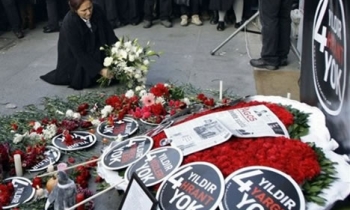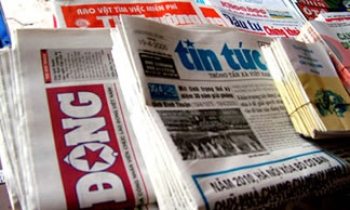US Internet giant Yahoo has settled a Californian lawsuit brought by the families of journalist Shi Tao and pro-democracy activist and blogger Wang Xiaoning, who were convicted and imprisoned on information which Yahoo! gave the Chinese authorities.
Yahoo has agreed to cover the legal costs of the plaintiffs but said details of the settlement were confidential. It said it would work to provide financial, humanitarian and legal support to the families. It would also create a humanitarian relief fund to support other dissidents and their families.
The announcement came just six days after Yahoo chief executive officer Jerry Yang and the company’s vice president and senior counsel, Michael Callahan, publicly apologised to the families during a US congressional hearing.
The suit, advanced by the World Organisation for Human Rights USA, maintained that Yahoo had benefited financially by working with China. The advocacy group said that, in settling the case, Yahoo and its co-founder and chief executive, Jerry Yang, had bowed to criticism of the company at a televised congressional hearing in Washington last week.
"While technologically and financially you are giants, morally you are pygmies," Tom Lantos, a California Democrat and chairman of the House Committee on Foreign Affairs, told Yang as he testified before Congress last Tuesday. In a statement after the settlement, Lantos called the action by Yahoo long overdue. "It took a tongue-lashing from Congress before these high-tech titans did the right thing," the politician said. "What a disgrace.
“This is a real relief for the families,” Reporters sans Frontières (RSF) said. “The November 6 congressional hearing lent a human face to the tragedy they have been living for years. But this settlement should not end the debate about the involvement that companies such as Yahoo! may have in revealing personal data to the authorities in countries such as China."

The press freedom organisation said: “We hail the efforts of the lawyers of the World Organisation for Human Rights USA (WOHR USA) and the chairman of the House Committee on Foreign Affairs,Tom Lantos, and the congressman Chris Smith. What they did was decisive in ensuring that justice was rendered to the families of Shi and Wang. We reiterate our call for the release of Shi and Wang and of Li Zhi.”
Alibaba.com, China's biggest online commerce firm, has run Yahoo's mainland China operations since Yahoo bought a 40 per cent stake in Alibaba in 2005. Shi and Wang sued Yahoo and Alibaba in April. Yahoo, an Associated Press (AP) report said, would not say whether its dealings in China or Alibaba's mode of responding to government requests will change as a result of the settlement. But Yahoo has said it only owns a 40 percent stake in Alibaba and has no control over the Chinese company, a subsidiary of Alibaba Group.
At least four Chinese cyber-dissidents have been arrested since 2002 as a result of information which Yahoo provided to the Chinese authorities. Both Shi and Wang are serving 10-year prison sentences because of the supposedly “subversive” content they posted or exchanged online. Shi was convicted in 2005. Wang was convicted in 2003.
In the lawsuit, filed in April in San Francisco, Wang claimed Yahoo's Hong Kong subsidiary gave Chinese officials email records, email addresses, user identification numbers and other identifying information about him, Bloomberg News reported. In 2000 and 2001, Wang posted his journals and pro-democracy articles with a Yahoo email group and sent his writings anonymously to email addresses. The information helped Chinese officials to identify and convict Wang, who was sentenced in 2003 and has suffered severe physical and psychological abuse in prison, he said in court papers.
Shi was sentenced to 10 years in prison in 2005 for sending a government memo about potential unrest on the anniversary of the Tiananmen Square crackdown to overseas sites. Police identified him using information provided by Yahoo.

In April, Yahoo said if companies doing business in China don't comply with Chinese law, their local employees could face civil or criminal penalties. Yang told lawmakers November 6 that Yahoo is committed to protecting human rights abroad and is working with human-rights groups to develop an industry code of conduct for technology companies.
Yang announced that he is going to create a human rights fund dedicated to helping imprisoned cyber-dissidents and their families. “After meeting with the families, it was clear to me what we had to do to make this right for them, for Yahoo and for the future,” Yang said. “Yahoo was founded on the idea that the free exchange of information can fundamentally change how people lead their lives, conduct their business and interact with governments."
"Yahoo should extend this aid to the families of Li Zhi and Jiang Lijun and to the families of other cyber-dissidents who have been the victims of Yahoo!’s cooperation with the Chinese authorities," RSF added.
The journalists' US attorney, Morton Sklar, said Yahoo's will to fight the lawsuit withered amid growing outcry after members of Congress accused company officials of misleading them. "There was a dramatic change in their position and that was strong incentive to settle," Sklar said, according to AP. "They did not want to be on the wrong side of this issue."
Sklar said he suspects there are many more dissidents in Chinese jails because of US companies' cooperation with the Chinese government. Sklar said there may be other lawsuits filed and further pressure on Capitol Hill if US companies don't soon change their business practices in China. "They will have to recognise they have to do more than just follow the law," Sklar said. "They can negotiate with the host countries and not be complicit in torture."









